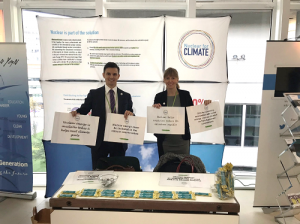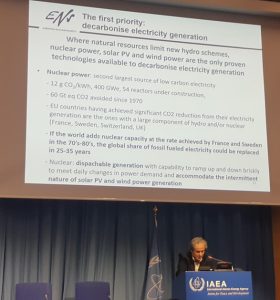The #Atoms4Climate Conference: Nuclear Vital to Meeting Climate Change Goals
From the 7 – 10 October, the first-ever IAEA conference on climate change and the role of nuclear power took place in Vienna. The conference came at a vital point in time- public concern about climate change is at an all-time high following months of climate activism and demonstrations on a global scale. The role that Nuclear Power could play in decarbonization and reaching zero emissions targets was discussed from multiple facets during the week, which had 550 participants from 79 member states.

The ENS was present and actively participated at the conference. Alongside attending the sessions, the ENS manned a Nuclear4Climate stand and engaged with attendees of the conference and employees at the IAEA.
The conference was opened by M. Chudakov (IAEA), C. Feruta (Acting DG, IAEA) and W. Magwood (DG, OECD/NEA). Mr. Chudakov stressed that nuclear power was not a new solution, and that it would be needed to meet the future challenges of both climate change and an increased global energy demand.
The first plenary session saw the Chair of the IPCC, H. Lee, spoke about the IPCC special report on limiting warning to 1.5C, which examines 21 models available which provided 85 pathways meet this 1.5C target. The projected increase in electrification (19 to 43% by 2050) will only reduce emissions if the power comes from non-fossil sources. Across most of these 85 pathways, nuclear power has been included as an important contribution to the decarbonization of electricity. It was highlighted that nuclear power could contribute to decarbonization in other sectors too, such as district heating.
The launch of the conference coincided with the release of the ENS High Scientific Council’s latest position paper, on the indispensability of nuclear in fighting climate change. You can read the position paper here.
 The second day of the conference addressed policy and financial aspects of nuclear projects, and also showcased perspectives from all around the world. Eric Proust, Chair of the ENS HSC, co-chaired and presented on the European perspective, highlighted that ‘the world is behind schedule to decarbonise the world economy; it has detrimental impact to humanity. There is no time to bet on unproven technology. The large-scale implementation of available solutions, i.e nuclear, must start now’.
The second day of the conference addressed policy and financial aspects of nuclear projects, and also showcased perspectives from all around the world. Eric Proust, Chair of the ENS HSC, co-chaired and presented on the European perspective, highlighted that ‘the world is behind schedule to decarbonise the world economy; it has detrimental impact to humanity. There is no time to bet on unproven technology. The large-scale implementation of available solutions, i.e nuclear, must start now’.
On the evening of the second day, the ENS was invited to the Millenial Nuclear Caucus by the US Mission to Vienna. To begin the session, the panel consisting of members of the young generation discussed their careers and why they worked in nuclear, with climate action being a key driver for many. Following the panel, attendees took part in a speed-networking session with a range of senior members of the industry.
The final full day of the conference was themed around Partnerships and Engagement. L. Angelino, from the International Renewable Energy Agency (IRENA), was part of a panel on Multilateral Partnership Mechanisms. He addressed lessons learned from IRENA’s previous partnership initiatives such as the Global Geothermal Alliance, highlighting that partnerships with governments work better when they are demand driven, with political buy-in. Partnerships should be established to address the different needs and challenges of different member states within the framework of the clean energy transition.
In the afternoon, past ENS-YGN Chair and current ENS treasurer E. Langegger presented on the growth of the Nuclear for Climate initiative since its founding 5 years ago and the lessons learned along the way.
Finally, the conference concluded with a session on the safety and security, with a closing plenary by M. Chudakov on the future of Nuclear Power and the role of the IAEA for international cooperation.



